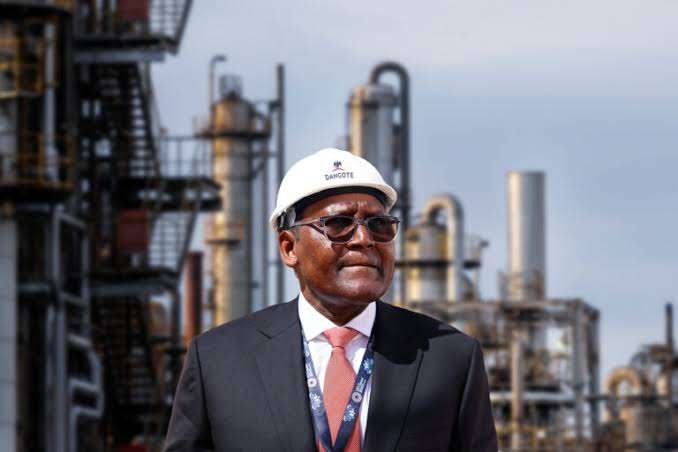
The Establishment of the Dangote Refinery: Challenges and Its Impact on Nigeria
The Dangote Refinery, located in Lagos, Nigeria, is a massive industrial complex that stands as the largest single-train refinery in the world. Established by Africa’s richest man, Aliko Dangote, this ambitious project has the potential to reshape Nigeria’s economy and reduce its dependence on imported petroleum products. However, its establishment has not been without challenges. This article delves into the history and purpose of the Dangote Refinery, the obstacles encountered during its construction, and the significant impact it promises for Nigeria’s economy.
An Overview of the Dangote Refinery
The Dangote Refinery was conceived to address one of Nigeria’s long-standing economic issues: the reliance on imported refined petroleum products. Although Nigeria is Africa’s largest crude oil producer, the country has historically lacked the refining capacity to meet its own fuel needs. Consequently, Nigeria has been heavily reliant on importing fuel, which has led to significant government expenditure on subsidies, fluctuating fuel prices, and reduced economic stability.
The Dangote Refinery is expected to refine up to 650,000 barrels of crude oil per day. Additionally, it includes petrochemical facilities to produce essential chemicals and fertilizers, a pipeline infrastructure for raw materials, and a deep-sea port to facilitate export and import. The project represents an unprecedented investment in Nigeria’s industrial sector, estimated at around $19 billion.
Key Challenges in Establishing the Dangote Refinery
Building a refinery of this scale is no small feat, and the Dangote Refinery has faced several challenges throughout its development:
1. Financial Constraints and Funding
The scale of the Dangote Refinery required enormous capital investment, which initially posed a significant hurdle. Securing funding for a project of this magnitude was challenging, especially considering the fluctuations in global oil prices and Nigeria’s economic climate. Dangote Group leveraged a mix of equity, loans, and support from international and local investors to meet its funding needs, but the financing process was complex and time-consuming.
2. Infrastructure and Logistics Issues
The site of the refinery, located in Lekki Free Trade Zone, required extensive infrastructure development. This included creating roads, water treatment facilities, and power plants to ensure a steady supply of electricity. Additionally, transporting equipment and raw materials for construction was logistically demanding, given Nigeria’s limited road infrastructure and high traffic congestion in Lagos.
3. Delays Due to Equipment and Construction
The complexity of building a refinery that adheres to global standards resulted in several delays. Importing specialized equipment and finding skilled labor further compounded the delay, particularly due to disruptions in the global supply chain. The refinery’s completion timeline was extended several times as a result, sparking concerns about whether the project would meet its original objectives.
4. Regulatory Hurdles and Bureaucracy
Navigating Nigeria’s regulatory environment proved challenging. The Dangote Group had to comply with various government policies, acquire permits, and meet international environmental standards. Bureaucratic inefficiencies delayed certain phases of the project, adding to the financial strain and slowing down progress.
5. COVID-19 Pandemic
The global COVID-19 pandemic introduced unforeseen delays, as lockdowns and restrictions hindered workforce movement, supply chains, and funding timelines. The pandemic led to labor shortages and halted international travel, impacting the procurement and assembly of critical equipment.
Despite these challenges, the Dangote Refinery has persevered, nearing completion with expectations to transform Nigeria’s energy landscape.
How the Dangote Refinery Has Helped Nigeria
While the Dangote Refinery is still in its early stages of production, its potential benefits for Nigeria are immense. Here are some key areas where the refinery is expected to make a positive impact:
1. Reducing Fuel Imports and Saving Foreign Exchange
Nigeria spends billions annually on fuel imports due to insufficient local refining capacity. With the Dangote Refinery operational, the country can refine its crude oil domestically, significantly reducing the need for imports. This shift is expected to save the country around $10 billion in foreign exchange annually, which can be redirected toward other critical areas of the economy, such as healthcare, education, and infrastructure.
2. Boosting the Nigerian Economy
The refinery is expected to create thousands of direct and indirect jobs across the petroleum, petrochemical, and service sectors. The project has already provided employment during its construction phase, contributing to local job creation and skills development. Once fully operational, the refinery will further boost the economy by creating a more self-reliant energy sector and attracting foreign investment.
3. Reducing Fuel Subsidy Burden
The Nigerian government has historically subsidized fuel prices to make them affordable for its citizens. This has placed a massive financial strain on the government’s budget. The Dangote Refinery’s output can significantly reduce the need for these subsidies, allowing the government to reallocate funds to other pressing needs and improve national fiscal stability.
4. Improving Nigeria’s Trade Balance
Nigeria’s heavy reliance on fuel imports has led to a trade imbalance, where the nation exports crude oil but imports refined petroleum products at a higher cost. By producing refined products domestically, Nigeria can reduce its import bill and possibly become a net exporter of refined petroleum products. This improvement in the trade balance can positively impact Nigeria’s currency stability and help reduce inflation.
5. Enhancing Energy Security
The refinery will enhance Nigeria’s energy security by providing a reliable and consistent supply of refined petroleum products, making the country less susceptible to global market fluctuations. This self-sufficiency will also protect Nigeria from fuel scarcity and help stabilize domestic prices, benefiting Nigerian consumers and businesses alike.
6. Development of Related Industries
The Dangote Refinery’s petrochemical and fertilizer plants can boost industries that rely on these products, such as agriculture and manufacturing. Increased availability of fertilizers at lower costs can significantly improve Nigeria’s agricultural productivity, contributing to food security and rural development. Similarly, access to petrochemicals supports Nigeria’s burgeoning industrial sector, fostering growth in local manufacturing and reducing dependency on imported raw materials.
7. Positioning Nigeria as an Energy Hub in Africa
The Dangote Refinery, with its large refining capacity, places Nigeria in a unique position to become a regional energy hub. Neighboring African countries that currently depend on imported fuel may turn to Nigeria for refined products, enhancing regional trade relationships. This could open the door to new trade agreements and strengthen Nigeria’s influence in the African energy market.
Future Prospects and Potential Challenges Ahead
While the Dangote Refinery offers promising opportunities, there are still some challenges and considerations to keep in mind:
- Sustaining Efficiency and Maintenance: The refinery will need to maintain high operational standards and efficiency to remain competitive and profitable. Regular maintenance and potential upgrades will be essential for long-term success.
- Global Oil Market Volatility: The refinery’s profitability depends, in part, on global oil prices. Prolonged periods of low oil prices could impact the profitability of refining operations, particularly if demand falls or if the cost of crude imports rises.
- Environmental Concerns: As with any large industrial project, the Dangote Refinery will need to address environmental issues related to emissions, waste, and its impact on the surrounding ecosystem. Adherence to environmental standards will be crucial to minimizing the negative impact on local communities.
- Navigating Geopolitical and Economic Factors: Nigeria’s economy is often affected by geopolitical tensions and shifts in global trade dynamics. The refinery may need to adapt to these external pressures while maintaining consistent operations.
Conclusion
The establishment of the Dangote Refinery marks a significant milestone in Nigeria’s economic journey. Despite facing numerous challenges, the refinery promises to transform Nigeria’s energy sector by reducing fuel imports, saving foreign exchange, and providing a stable domestic supply of refined products. Its impact extends beyond just energy, promising job creation, industry development, and enhanced trade relations within Africa.
As Nigeria looks toward a more self-sufficient future, the Dangote Refinery exemplifies the importance of ambitious infrastructure projects in driving sustainable economic growth. By investing in local refining capacity and reducing its reliance on imports, Nigeria is taking a crucial step toward greater financial resilience and regional influence in the energy sector. The success of the Dangote Refinery could serve as a blueprint for other large-scale industrial initiatives, fostering a more robust and diversified Nigerian economy.








